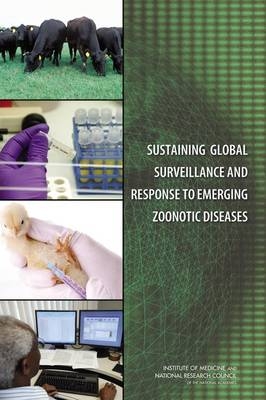
Sustaining Global Surveillance and Response to Emerging Zoonotic Diseases
Seiten
2010
National Academies Press (Verlag)
978-0-309-13734-8 (ISBN)
National Academies Press (Verlag)
978-0-309-13734-8 (ISBN)
H1N1 ("swine flu"), SARS, mad cow disease, and HIV/AIDS are a few examples of zoonotic diseases-diseases transmitted between humans and animals. Zoonotic diseases are a growing concern given multiple factors: their often novel and unpredictable nature, their ability to emerge anywhere and spread rapidly around the globe, and their major economic toll on several disparate industries.
Infectious disease surveillance systems are used to detect this threat to human and animal health. By systematically collecting data on the occurrence of infectious diseases in humans and animals, investigators can track the spread of disease and provide an early warning to human and animal health officials, nationally and internationally, for follow-up and response. Unfortunately, and for many reasons, current disease surveillance has been ineffective or untimely in alerting officials to emerging zoonotic diseases.
Sustaining Global Surveillance and Response to Emerging Zoonotic Diseases assesses some of the disease surveillance systems around the world, and recommends ways to improve early detection and response. The book presents solutions for improved coordination between human and animal health sectors, and among governments and international organizations.
Parties seeking to improve the detection and response to zoonotic diseases—including U.S. government and international health policy makers, researchers, epidemiologists, human health clinicians, and veterinarians—can use this book to help curtail the threat zoonotic diseases pose to economies, societies, and health.
Table of Contents
Front Matter
Summary
1 Introduction
2 Making the Case for Zoonotic Disease Surveillance
3 Drivers of Zoonotic Diseases
4 Achieving an Effective Zoonotic Disease Surveillance System
5 Incentives for Disease Surveillance, Reporting, and Response
6 Sustainable Financing for Global Disease Surveillance and Response
7 Governance Challenges for Zoonotic Disease Surveillance, Reporting, and Response
8 Recommendations, Challenges, and Looking to the Future
Appendix A: Glossary of Terms
Appendix B: Surveillance and Response of Select Zoonotic Disease Outbreaks
Appendix C: Novel Human Pathogen Species
Appendix D: Public Committee Meeting Agendas
Appendix E: Committee Biosketches
Infectious disease surveillance systems are used to detect this threat to human and animal health. By systematically collecting data on the occurrence of infectious diseases in humans and animals, investigators can track the spread of disease and provide an early warning to human and animal health officials, nationally and internationally, for follow-up and response. Unfortunately, and for many reasons, current disease surveillance has been ineffective or untimely in alerting officials to emerging zoonotic diseases.
Sustaining Global Surveillance and Response to Emerging Zoonotic Diseases assesses some of the disease surveillance systems around the world, and recommends ways to improve early detection and response. The book presents solutions for improved coordination between human and animal health sectors, and among governments and international organizations.
Parties seeking to improve the detection and response to zoonotic diseases—including U.S. government and international health policy makers, researchers, epidemiologists, human health clinicians, and veterinarians—can use this book to help curtail the threat zoonotic diseases pose to economies, societies, and health.
Table of Contents
Front Matter
Summary
1 Introduction
2 Making the Case for Zoonotic Disease Surveillance
3 Drivers of Zoonotic Diseases
4 Achieving an Effective Zoonotic Disease Surveillance System
5 Incentives for Disease Surveillance, Reporting, and Response
6 Sustainable Financing for Global Disease Surveillance and Response
7 Governance Challenges for Zoonotic Disease Surveillance, Reporting, and Response
8 Recommendations, Challenges, and Looking to the Future
Appendix A: Glossary of Terms
Appendix B: Surveillance and Response of Select Zoonotic Disease Outbreaks
Appendix C: Novel Human Pathogen Species
Appendix D: Public Committee Meeting Agendas
Appendix E: Committee Biosketches
1 Front Matter; 2 Summary; 3 1 Introduction; 4 2 Making the Case for Zoonotic Disease Surveillance; 5 3 Drivers of Zoonotic Diseases; 6 4 Achieving an Effective Zoonotic Disease Surveillance System; 7 5 Incentives for Disease Surveillance, Reporting, and Response; 8 6 Sustainable Financing for Global Disease Surveillance and Response; 9 7 Governance Challenges for Zoonotic Disease Surveillance, Reporting, and Response; 10 8 Recommendations, Challenges, and Looking to the Future; 11 Appendix A: Glossary of Terms; 12 Appendix B: Surveillance and Response of Select Zoonotic Disease Outbreaks; 13 Appendix C: Novel Human Pathogen Species; 14 Appendix D: Public Committee Meeting Agendas; 15 Appendix E: Committee Biosketches
| Erscheint lt. Verlag | 24.1.2010 |
|---|---|
| Verlagsort | Washington |
| Sprache | englisch |
| Maße | 152 x 229 mm |
| Themenwelt | Studium ► Querschnittsbereiche ► Epidemiologie / Med. Biometrie |
| Studium ► Querschnittsbereiche ► Infektiologie / Immunologie | |
| ISBN-10 | 0-309-13734-9 / 0309137349 |
| ISBN-13 | 978-0-309-13734-8 / 9780309137348 |
| Zustand | Neuware |
| Haben Sie eine Frage zum Produkt? |
Mehr entdecken
aus dem Bereich
aus dem Bereich
ein überfälliges Gespräch zu einer Pandemie, die nicht die letzte …
Buch | Hardcover (2024)
Ullstein Buchverlage
24,99 €


